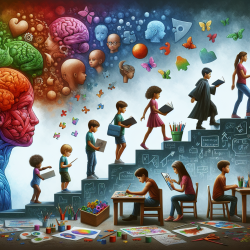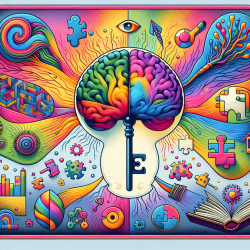Introduction
In the realm of speech-language pathology, understanding the intricate relationship between education, intellectual activity, and cognition is crucial for fostering optimal outcomes in children. A recent study, "The Role of Education and Intellectual Activity on Cognition," sheds light on how educational attainment and engagement in intellectually demanding activities can influence cognitive performance. This blog explores the implications of these findings for practitioners, emphasizing the importance of data-driven decisions in enhancing child development.
The Study: Key Insights
The research article examines how education and intellectual activities contribute to cognitive performance in adulthood. Utilizing data from the Baltimore Experience Corps Trial, the study investigates the combined and unique contributions of various lifestyle activities on the relationship between education and cognition. The findings reveal that higher educational attainment is associated with greater cognitive performance and a reduced risk of cognitive decline. However, the study also highlights that frequent participation in intellectually demanding activities partially explains these education-cognition relations.
Implications for Practitioners
For speech-language pathologists and educators, these findings underscore the importance of fostering an intellectually stimulating environment for children. Here are some practical strategies to implement:
- Encourage Lifelong Learning: Promote a culture of curiosity and continuous learning. Encourage children to explore new topics and engage in activities that challenge their cognitive abilities.
- Incorporate Diverse Activities: Introduce a variety of intellectually demanding activities, such as reading, problem-solving games, and creative projects, to stimulate different cognitive processes.
- Foster Social and Intellectual Engagement: Create opportunities for children to engage in discussions, collaborative projects, and other social activities that require cognitive effort and decision-making.
Encouraging Further Research
While the study provides valuable insights, it also highlights the need for further research to explore the complex interplay between education, intellectual activities, and cognition. Practitioners are encouraged to contribute to this growing body of knowledge by conducting studies that investigate these relationships in diverse populations and settings.
Conclusion
In conclusion, the findings from "The Role of Education and Intellectual Activity on Cognition" offer a compelling case for the power of education and intellectual engagement in shaping cognitive outcomes. By implementing these insights into practice, speech-language pathologists and educators can play a pivotal role in nurturing the cognitive potential of children. To read the original research paper, please follow this link: The Role of Education and Intellectual Activity on Cognition.










